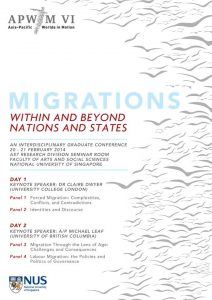Memo #289
By Grégoire Legault – gregoire.legault [at] alumni.ubc.ca
 The world is changing, thanks in great part to unparalleled levels of migration. According to the United Nations, more than 230 million people were living outside of their countries of birth in 2013, many of them originally born in Asia. Conceptually, foreign-born residents of third countries already constitute the world’s sixth largest nation. Welcome to the age of movement, an era that will modify our understanding of identity and nationalism forever.
The world is changing, thanks in great part to unparalleled levels of migration. According to the United Nations, more than 230 million people were living outside of their countries of birth in 2013, many of them originally born in Asia. Conceptually, foreign-born residents of third countries already constitute the world’s sixth largest nation. Welcome to the age of movement, an era that will modify our understanding of identity and nationalism forever.
Third culture kids (TCKs)—individuals who have spent their developmental years outside their parents’ passport culture—are at the vanguard of this new era. TCKs are challenging existing notions of identity, and in the long-run, may generate pressure on governments in the Asia-Pacific and elsewhere to grant them more rights, especially in the realm of international labour and citizenship. Yet in Asia, research on TCKs has largely focused on how to reintroduce them back into a given society rather than celebrating their cosmopolitan identity.
TCKs could also help produce a functional theory of cosmopolitanism, or a sense of community that can exist locally and be applied globally. Cosmopolitanism is necessary in today’s world of conflicting cultures and political interests closely situated and in continuous contact. Mono-cultural societies, for which nationalism was once a morally and politically useful idea, are becoming obsolete. Cities, and even states, are becoming denationalized, multicultural and hybrid. Cosmopolitanism is rooted in the belief that a global order requires global citizens not bound by exclusive membership to a territorial community. It is also an idea that has to be internalized by communities.
Currently, the world lacks the institutions to formally establish a cosmopolitan society. Barriers arise from nationalism, the sovereignty of the nation-state and many scholars who have relegated cosmopolitanism to theory and failed to render it relevant and practical. Nevertheless, the unplanned cosmopolitan developments among TCKs and transnational family arrangements mean that it may be time to revisit the idea.
More than individuals with international connections, TCKs are globally-minded citizens able to navigate highly complex multicultural environments. They are the best hope for generating grassroots traction in both ideological and practical terms for building a truly cosmopolitan agenda and community of people.
About the Author:
Grégoire Legault is a Master in Asia Pacific Policy Studies candidate at the University of British Columbia and a Research Assistant in the Centre for Chinese Research. You can follow him on Twitter, connect with him on Linkedin or visit his photo blog.
-
Links:
- “Migration and Remittances,” The World Bank, September 2013
- Grégoire Legault, “Third Culture Kids and the Rise of a Cosmopolitan Ethos in the Asia-Pacific,” Asia-Pacific Worlds in Motion 6, Singapore, February 2014
- David C. Pollock, Third Culture Kids: Growing Up Among Worlds, 2009
- Amartya Sen, Identity and Violence: The Illusion of Destiny, 2013
- Kwame Anthony Appiah, Cosmopolitanism: Ethics in a World of Strangers, 2007

Comments are closed, but trackbacks and pingbacks are open.